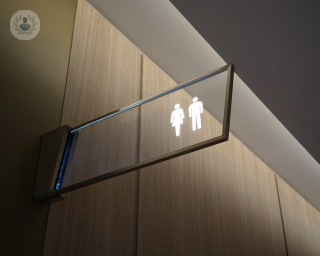What is stress incontinence?
Stress incontinence is when urine leaks out at times when your bladder is under physical pressure for example if you laugh or cough, run, sneeze or lift something heavy. Stress incontinence occurs is much more common in women than in men.
The condition can impact your mental health, you may at times feel embarrassed, isolate yourself, or limit your social and work life, especially leisure and exercise activities.
What are the causes of urinary incontinence?
It’s usually the result of either damage to the muscles such as the urethral sphincter or pelvic floor muscles used to prevent urination or the weakening of them.
The bladder expands as it fills with urine. Usually, valve-like muscles in the urethra stay closed as the bladder expands. It prevents urine leakage until you reach a toilet.
However, if these muscles weaken, anything that adds pressure on the pelvic and abdominal muscles can cause pressure on your bladder and cause you to leak urine.
Factors that can increase the risk of developing stress incontinence can include the weakening of muscles. If you’re obese or overweight, the excess weight can increase pressure on the abdominal and pelvic organs.
Prostate surgery is one of the most common causes of stress incontinence in men. When the prostate gland is removed (prostatectomy) to treat prostate cancer this may result in a weakened sphincter.
In women, childbirth can weaken the pelvic floor muscles or the sphincter can weaken because of nerve or tissue damage during the delivery of a child. Stress incontinence from this can occur years later or soon after the birth of the child. Hysterectomies can also cause stress incontinence. Some connective tissue disorders (for example Ehlers Danlos syndrome) and neurological conditions that affect the spinal cord and brain can also cause urinary incontinence.
How can stress incontinence be treated?
Strategies
There are a variety of treatment strategies to end or reduce the number of incontinence episodes.
- Pelvic floor muscle exercises – These movements can strengthen your pelvic floor muscles and urinary sphincter.
- Changes to lifestyle – Losing excess weight, treating a chronic cough and quitting smoking, for example, can lessen episodes of stress incontinence
- Training your bladder – Scheduling times to empty your bladder can reduce the severity or number of incontinence episodes.
- Fluid consumption – You may be recommended a certain amount and be given times when you’re allowed to.
- Medication – If you’re unsuitable for surgery or want to avoid having an operation, you may benefit from a medication called duloxetine.
- Devices – Certain devices designed for women may help control stress incontinence
Various surgeries can be carried out to treat stress incontinence, these include colposuspension, sling surgery and vaginal mesh surgery.
Other options can include Urethral bulking agents for women which increases the size of the urethra so it stays closed with more force. An artificial urinary sphincter can also help relieve incontinence.
11-12-2019Stress incontinence
What is stress incontinence?
Stress incontinence is when urine leaks out at times when your bladder is under physical pressure for example if you laugh or cough, run, sneeze or lift something heavy. Stress incontinence occurs is much more common in women than in men.
The condition can impact your mental health, you may at times feel embarrassed, isolate yourself, or limit your social and work life, especially leisure and exercise activities.
What are the causes of urinary incontinence?
It’s usually the result of either damage to the muscles such as the urethral sphincter or pelvic floor muscles used to prevent urination or the weakening of them.
The bladder expands as it fills with urine. Usually, valve-like muscles in the urethra stay closed as the bladder expands. It prevents urine leakage until you reach a toilet.
However, if these muscles weaken, anything that adds pressure on the pelvic and abdominal muscles can cause pressure on your bladder and cause you to leak urine.
Factors that can increase the risk of developing stress incontinence can include the weakening of muscles. If you’re obese or overweight, the excess weight can increase pressure on the abdominal and pelvic organs.
Prostate surgery is one of the most common causes of stress incontinence in men. When the prostate gland is removed (prostatectomy) to treat prostate cancer this may result in a weakened sphincter.
In women, childbirth can weaken the pelvic floor muscles or the sphincter can weaken because of nerve or tissue damage during the delivery of a child. Stress incontinence from this can occur years later or soon after the birth of the child. Hysterectomies can also cause stress incontinence. Some connective tissue disorders (for example Ehlers Danlos syndrome) and neurological conditions that affect the spinal cord and brain can also cause urinary incontinence.
How can stress incontinence be treated?
Strategies
There are a variety of treatment strategies to end or reduce the number of incontinence episodes.
- Pelvic floor muscle exercises – These movements can strengthen your pelvic floor muscles and urinary sphincter.
- Changes to lifestyle – Losing excess weight, treating a chronic cough and quitting smoking, for example, can lessen episodes of stress incontinence
- Training your bladder – Scheduling times to empty your bladder can reduce the severity or number of incontinence episodes.
- Fluid consumption – You may be recommended a certain amount and be given times when you’re allowed to.
- Medication – If you’re unsuitable for surgery or want to avoid having an operation, you may benefit from a medication called duloxetine.
- Devices – Certain devices designed for women may help control stress incontinence
Various surgeries can be carried out to treat stress incontinence, these include colposuspension, sling surgery and vaginal mesh surgery.
Other options can include Urethral bulking agents for women which increases the size of the urethra so it stays closed with more force. An artificial urinary sphincter can also help relieve incontinence.


Urinary incontinence in men and women: What are the causes?
Por Mr Rajesh Kavia
2025-01-04
In this informative article, highly respected consultant urological surgeon Mr Rajesh Kavia shares his expert insight on urinary incontinence in both men and women. подробнее


Artificial urinary sphincter surgery for the relief of urinary incontinence
Por Mr Rowland Rees
2025-01-04
Urinary incontinence refers to the involuntary passage of urine, a common problem that affects up to 3 million people in the UK. If you suffer from severe urinary incontinence, however, the implantation of an artificial urinary sphincter can help to resolve symptoms and improve quality of life. Here, Mr Rowland Rees, renowned consultant urologist and male genito-urethral surgeon, provides an expert insight into artificial urinary sphincter surgery. подробнее


An expert guide to bladder problems
Por Miss Victoria Asfour
2024-12-31
Highly esteemed consultant gynaecologist and obstetrician Miss Victoria Asfour shares her expert insight on common bladder and urinary problems and the lifestyle modifications which can help to resolve them in this informative article. подробнее


Stress incontinence of urine
Por Ms Charlotte Chaliha
2024-12-30
Stress urinary incontinence is a common and distressing symptom that affects 25-45% of women. Risk factors include previous pregnancy, vaginal delivery, obesity, and postmenopausal status. Obstetrician and urogynaecologist in London, Ms Charlotte Chaliha talks about how to stop stress incontinence and who is more at risk. подробнее
Врачи-специалисты в области Stress incontinence

HCA UK at The Shard
HCA UK at The Shard
32 St Thomas Street, SE1 9BS
No existe teléfono en el centro.
Si haces uso de este teléfono facilitado por TOP DOCTORS nos autorizas al tratamiento de tu teléfono para fines estadísticos y comerciales. Para más información, lee nuestra Политика конфиденциальности
Top Doctors

The London Independent Hospital - part of Circle Health Group
The London Independent Hospital - part of Circle Health Group
1 Beaumont Square, Stepney Green
No existe teléfono en el centro.
Si haces uso de este teléfono facilitado por TOP DOCTORS nos autorizas al tratamiento de tu teléfono para fines estadísticos y comerciales. Para más información, lee nuestra Политика конфиденциальности
Top Doctors

Guy’s and St Thomas’ Private Healthcare
Guy’s and St Thomas’ Private Healthcare
Guy’s Hospital, Great Maze Pond
No existe teléfono en el centro.
Si haces uso de este teléfono facilitado por TOP DOCTORS nos autorizas al tratamiento de tu teléfono para fines estadísticos y comerciales. Para más información, lee nuestra Политика конфиденциальности
Top Doctors
-
HCA UK at The Shard
32 St Thomas Street, SE1 9BS, Central LondonЭксперт в области :
- Ангиология и сосудистая хирургия
- Рак головы и шеи
- Рак молочной железы
- ортопедическая хирургия
- Хирургия грудной клетки
- Клиника скрининга рака
-
The London Independent Hospital - part of Circle Health Group
1 Beaumont Square, Stepney Green, East LondonЭксперт в области :
- Катаракта
- Бариатрическая хирургия
- Челюстно-лицевая хирургия
- Неврологическая хирургия позвоночника
- ортопедическая хирургия
- Ортопедическая хирургия позвоночника
-
Guy’s and St Thomas’ Private Healthcare
Guy’s Hospital, Great Maze Pond, SE1 South Bank LondonЭксперт в области :
- Аллергология
- Кардиология
- Общая хирургия
- Челюстно-лицевая хирургия
- Хирургия грудной клетки
- Материнство







